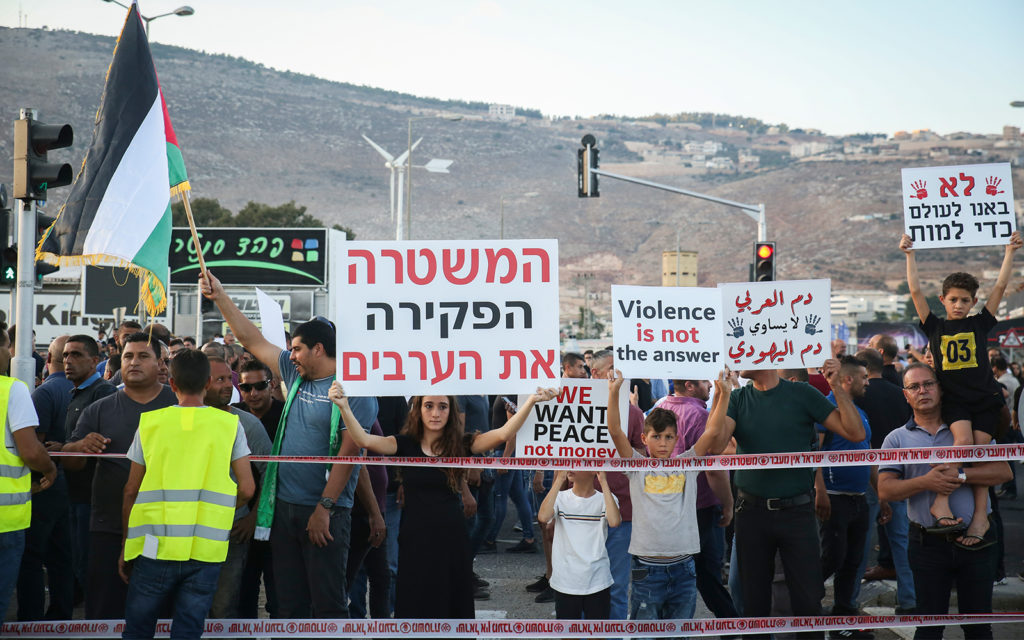Australia/Israel Review
Scribblings: A convoy of hope
Nov 6, 2019 | Tzvi Fleischer

On October 9, a large protest convoy drove from northern Israel to Jerusalem to present demands to the government, deliberately travelling slowly and blocking Israel’s major north-south highway, and causing traffic chaos.
Despite the severe inconvenience this protest caused to Israeli motorists and commuters, this event was a very positive one, which bodes well for Israel’s future as a democratic, inclusive, multicultural and Jewish state.
The convoy was part of a larger protest movement over recent weeks, predominantly by Israeli Arabs, with repeated demonstrations in the two weeks leading up to the convoy, a general strike of businesses and schools in many Arab towns, and additional demonstrations planned for late October.
What is all this about? Very simply, Israeli Arab leaders want Israel’s police and government to do more about the law and order problems in Israeli Arab towns and villages, and especially to confiscate illegal weapons.
They point out that there have been 73 violent deaths in Israeli Arab communities already this year, nearly as many as in each of the past two years, and that Israeli Arabs, who are 20% of the nation’s population, have accounted for more than half of all murder victims nationwide over the past three years.
Ayman Odeh, the head of the predominantly Arab Joint List political coalition in the Knesset, explained the goals of the protests on Oct. 2: “Blood is flowing through the streets even though everyone already knows the solution to the crime epidemic. Collect weapons, wage war on crime organisations and enact educational programs… Security can be restored to the streets.”
Why is this protest movement such a positive sign? Because it is particularly strong evidence of a trend this column has repeatedly tried to highlight over recent years – namely that the Israeli Arab minority is increasingly integrating into the country and identifying as Israeli, despite serious grievances, and seeking to work within Israeli society to attain full equality and build fulfilling lives.
Moreover, this pragmatic approach appears today to be spreading to Israeli Arab political leaders. In the past, the leaders of Arab political parties have been overwhelming focussed upon supporting Palestinian nationalism, or Pan-Arabism, or Baathism, or Islamism or various other external ideologies, at the expense of the local needs of their constituents.
So it is clearly a positive sign that these protests – led by the political representatives of the Arab community in the Knesset – are about pushing for concrete government action to improve the lives of Arab Israelis instead of ideological posturing. But there is something else that is even more positive about them.
Since the two Intifadas, which began in 1987 and 2000 respectively, Israeli Arab leaders have been extremely critical and distrustful of Israeli police. In 1987, the thousands of Arabs who served in the Israeli police force came under heavy pressure to quit, and most did. Then, in October 2000, Israeli police killed 13 Israeli Arabs who were taking part in violent demonstrations in sympathy with the Intifada, damaging Israeli Arab trust in the Israeli police severely for many years. Many Israeli Arab political leaders openly described the Israeli police as an “enemy” who were not welcome in Israeli Arab towns.
Yet today, the Israeli Arab leadership are essentially demanding that the Israeli police come into their towns, confront violent gangs, and confiscate illegally held weapons. It’s a huge turnaround and a very heartening one.
This comes on top of the signs of pragmatism displayed by Arab political leaders during the Israeli election on Sept. 17.
That poll saw a major jump in terms of Israeli Arab voting participation rates, and resulted in the Joint List becoming the third largest party in the Knesset, with 13 seats. But more importantly, the electoral campaign of the Joint List was focussed primarily on pragmatic issues of education, employment, housing and so forth for their communities, not Palestinian nationalism or other ideologies.
Pre-election, Joint List head Odeh even hinted that he might be interested in joining a governing coalition – something no predominantly Arab party has ever been willing to do in Israeli history.
He was attacked by some of the other members of the List (the list is actually an alliance of four small, very ideologically disparate parties) for these hints, but even after the election, most of the Joint List (except for one radical sub-faction) told Israeli President Reuven Rivlin that it supported Benny Gantz of the Blue and White party to become Prime Minister. In the past, with the exception of the 1992 to 1995 Rabin Government, most Israeli Arab parties have refused to support any “Zionist” politician becoming prime minister.
Returning to the Oct. 9 convoy, when it arrived in Jerusalem, its leaders met with Israeli Public Security Minister Gilad Erdan and representatives of the Israeli police, who promised to do their best to address Arab concerns.
Police spokesman Micky Rosenfeld pointed out that the police have been trying to address the problem, and seven new police stations have already been opened in Arab communities this year and there are plans to open eight more in the coming months.
For his part, Erdan has said, “The level of violence and crime in Arab communities requires a determined fight with every tool at the state’s disposal. A state of emergency needs to be declared.”
But police have also said local leaders need to do more to cooperate with police and help prevent violence, and some Arab leaders have said they are ready to do so.
If such cooperation is successful, the protest campaign will not only have achieved its laudable goals in terms of improving law and order for Israeli Arab towns, but could serve as a model for how Israeli Arabs can gain from improved integration into Israeli society.
Tags: Arab Israelis, Israel






